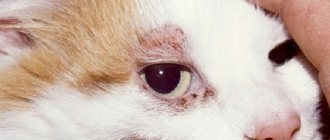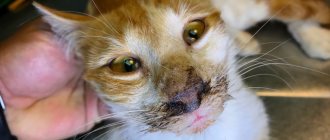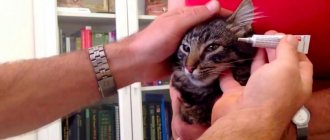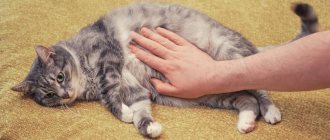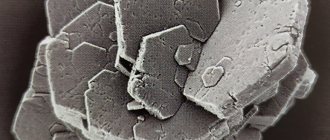The cat was not always a domestic cat, and even in the wild she was very careful about what she was going to eat.
This caution has continued to this day. This is why food poisoning in a cat is extremely rare, but there are other ways that poison can enter the animal’s body. How can an owner recognize that a pet has been poisoned, what to do and where to go?
What is poisoning
Poisoning in a cat is a dysfunction of organs and organ systems due to toxic substances of various origins entering the body. Well, to put it simply, if poison enters the animal’s body (and not always with food or water), then all functions are disrupted and specific clinical signs appear.
And having noticed them, the owner must provide first aid, that is, do what will help the pet “hold out” for comprehensive treatment from a doctor. And after it is provided, be sure to contact a veterinary clinic for qualified veterinary care.
When is a vet needed?
You should consult a doctor for any type of poisoning. The doctor will examine the animal, conduct the necessary examinations and select appropriate medications. If possible, it is recommended to bring with you the substance that caused the poisoning, vomit. Be sure to talk about the symptoms that arise and the actions taken. Vetapteka medicines .
We recommend: What to feed your dog in case of poisoning
It is necessary to visit a doctor if the kitten’s condition does not improve and the symptoms develop intensively.
In severe cases, treatment is carried out in a hospital, specific procedures and droppers with medicinal solutions are prescribed. Surgical interventions are not excluded.
Ways of poison entering the animal's body
- Nutritional. In this case, the toxin enters the animal’s body through the mouth (that is, with food, drink). Symptoms that a cat has been poisoned may vary depending on the origin of the poison (food, medications, phosphides, rat poison, etc.). But the main signs of such poisoning are the cat’s diarrhea and vomiting.
- Aerogenic. Everything is simple here: the cat inhaled vapors/toxic gases, toxins enter the lungs, are absorbed into the blood and spread throughout the body. That's all - the pet was poisoned.
- Through the skin, mucous membranes. Often the cause of such poisoning lies in the treatment of the animal against fleas, ticks and other parasites (often due to an overdose of the drug or its improper use). Or it also happens that a pet runs through beds treated with pesticides/insecticides/herbicides, lays down on a floor that has just been washed with household chemicals, or somehow manages to get dirty in toxic substances (its paws will fit into paint, its muzzle will get into washing powder) . The poison enters the blood through the skin or mucous membrane (the same conjunctiva).
- Intravenous, intramuscular, subcutaneous, intradermal and other methods. The owner could have injected something, made a mistake with the drug or dosage, maybe even the injection site. As a result, the animal becomes intoxicated. Therefore, it is still advisable to trust a veterinarian to give any injections, and not to prescribe medications on your own on the advice of neighbors or colleagues.
Poisoning through the respiratory tract
The poison can enter the body through the respiratory tract, for example, by inhaling smoke, gases, insecticides and other substances. Carbon monoxide poisoning occurs when gas stoves and other appliances leak gas in unventilated areas. A cat can be poisoned by exhaust gases in the garage, and by vapors of solvents in the room where painting work is carried out.
Symptoms: vomiting, drooling, rapid pulse, lethargy, shortness of breath, convulsions, loss of consciousness.
First aid: in case of poisoning with gaseous poisons, it is necessary, first of all, to take the cat out into fresh air, clear the airways and, if necessary, carry out a procedure for inducing breathing in combination with cardiac massage. Place a cotton swab moistened with ammonia to your nostrils. Take the cat to the veterinarian.
When evacuating a cat from a dangerous place, cover your face with a damp handkerchief and try to hold your breath.
Prevention: do not leave the cat in poorly ventilated areas, garages, bathhouses, kitchens, etc.
Possible causes of poisoning
As mentioned above, the cat is a very cautious animal with an excellent sense of smell. Therefore, it is extremely rarely her own fault for being poisoned. Is it just kids because of their desire to know the whole world around them, or an adult animal that is very curious.
But if the owner knows about the measures to prevent poisoning in a cat, then he will try to secure the home and also prevent his pet from coming into contact with toxic substances.
- Poor quality food. Sometimes owners, in order to save their time, or laziness, or some other reason understandable only to him, give the cat spoiled food (the remains of their own, which have already begun to sour, or the expiration dates are coming to an end). Usually the animal carefully sniffs everything in the bowl, but if the pet is young, inexperienced, or has a cold (and therefore the sense of smell has become a little dull), or is perhaps too hungry, then it may eat spoiled food.
- Medications. Some owners self-medicate or ignore the recommendations of a veterinarian who has prescribed a drug for a sick animal. And due to an overdose or an incorrectly administered medication, the cat becomes poisoned. And without professional help, your pet can be seriously harmed.
- Insect or snake bites, resulting in poison in the animal’s blood. Sometimes the owner does not immediately notice that the animal has been bitten. But in this situation you need to act quickly, otherwise rapid death will occur due to anaphylactic shock. However, how many owners know what to do if a cat is bitten by a snake or a bee?
- Not hidden household chemicals, paints, pesticides or other poisons. A curious animal, especially a young one, will sniff, lick or simply touch with its paw (which it will then lick or wash itself with this paw) a jar of chemicals. If you decide to do home renovations or general cleaning, then the animal must be isolated, or even better, temporarily “relocated” to a safe environment: with friends and relatives. Or at least remove it to a separate room, where it is safe and also has good ventilation (but there should be no drafts).
- Do you have a lot of indoor plants or do you have a wide variety of vegetation in your flower beds/lawn? Be sure to check each one to see if it is poisonous to cats! Many decorative indoor flowers are poisonous to pets, and the cat does not always “guess” this. He chewed a leaf, either for fun or out of harm, and got poisoned, and then the owner doesn’t know what to do.
- I would also like to highlight rat poison poisoning as a separate point! When neighbors poison rodents (in an apartment building or a private building), the dying rodents “crawl” into the light, where the cats catch them. Purr eats a poisoned mouse, as a result of which the poison enters the hunter's body. The symptoms are specific, so the owner who knows about them quickly understands that their beloved pet has been poisoned.
Nutrition and prevention
After any poisoning, it is necessary to review the kitten's diet. It is better to choose gentle food that does not injure the irritated stomach and intestines. In most cases, it is recommended not to feed the pet for a certain period of time, then the baby is provided with food three to four times a day.
During the first days the kitten is not given milk. Food includes porridge and low-fat foods. Portions should be small, food should be warm. After a week, you can return to your normal diet. It is possible to avoid intoxication in a kitten by following simple preventive measures.
Rules:
- Monitor your pet’s movement and do not allow it into places where food waste accumulates;
- When baiting rodents, send them to another room or place of residence;
- Use flea and tick products with extreme care;
- Medicines and household chemicals are placed in places inaccessible to the baby;
- On the street they make sure that the small pet does not eat poisonous plants;
An attentive owner will try to prevent poisoning from occurring. Poisoning in a kitten leads to organ dysfunction and can cause death. Compliance with prevention and attentiveness will help protect your small pet from unpleasant consequences.
Symptoms of poisoning in a cat
The most common symptoms of poisoning are diarrhea in the cat, vomiting, depression (sometimes, on the contrary, overexcitement). Body temperature drops, which slows down metabolism, and the poison is less absorbed. Due to the fact that the cat has diarrhea and vomiting, dehydration develops. And the body “demands” restoration of the water balance, so thirst increases, the animal tries to drink as much as possible.
When poisoned by rat poison, a cat has diarrhea and bloody vomiting, and with a small wound, the blood flows almost without interruption. And all because vitamin K, which is necessary for blood clotting, is destroyed. The animal will also have convulsions, disruption of the central nervous system (apathy, drowsiness), and body temperature may increase.
Sometimes the symptoms appear immediately, sometimes they are mild and this lethargic behavior persists in the cat for a week, but more often than not, within a couple of days without treatment the animal dies in terrible agony.
Symptoms of intoxication
Signs of poisoning in pets and their intensity depend on the cause that provoked their appearance, the amount and toxicity of the toxic substance. Poisoning with unsuitable food products is considered the easiest in terms of treatment - with timely detection and treatment, the risk of death is minimal. Symptoms of intoxication with stale food appear after about 6–8 hours. When poisoning with chemicals, plants, or highly toxic substances, symptoms may appear within a few minutes.
Some houseplants, including geranium, cyclamen, aloe, dracaena, begonia and ficus, can cause poisoning in cats
Table: symptoms of poisoning depending on the cause
| Cause | Symptoms |
| Stale or prohibited food | Nausea, debilitating vomiting, apathy, refusal to feed. |
| Poisonous plants | Vomiting, diarrhea, increased general temperature, various heartbeat disorders - changes in the frequency and rhythm of contractions. |
| Isoniazid is a medical drug most often used by dog hunters to exterminate stray animals. | Vomiting - often with blood, profuse foam, severe weakness, loss of coordination, trembling in the paws, difficulty breathing. |
| Other medicines | Symptoms vary depending on the type of drug, but are similar to those of food poisoning - vomiting, diarrhea, weakness, refusal to eat. There is also a sharp drop in temperature. When an animal eats antidepressants or drugs containing narcotic substances, its behavior may change - the pet will be either very excited or, conversely, depressed. |
| Chemicals | Cough, runny nose, increased salivation, loss of coordination, skin irritation, itching, fever, convulsions, paralysis. |
| Rat poison | Severe dehydration, disturbances in the functioning of the central nervous system, internal bleeding, nosebleeds, abdominal pain, blood in the urine, black stools, shortness of breath, trembling. |
We recommend reading: Cats understand everything: training
Photo gallery: toxic substances
Accidentally eaten rat poison will cause dehydration and internal bleeding Household chemicals are dangerous for animals Food from the human table should not be given to pets All medications must be stored in places inaccessible to the pet A pet on a walk can become a victim of dog hunters who scatter deadly baits in order to destroy stray animals
Treatment of a poisoned cat. First aid
The first step is to prevent further contact with the toxic substance. Provide your pet with fresh air and plenty of fluids. If your cat is vomiting, you should not give antiemetic drugs without your veterinarian's permission!
The fact is that if a cat vomits, then the gastrointestinal tract is freed from toxins. The same applies to diarrhea. These are “emergency measures” of the body to prevent the poison from being absorbed through the intestinal mucosa.
It would be good to give adsorbents - coal, white clay (the first portion before washing the stomach, wait a little so that the toxin “settles” on the adsorbent, then rinse the stomach or induce vomiting, and then give coal again so that the remaining poison “binds” again and is not absorbed ).
The first thing the owner should do is provide as much water (clean) as possible so that the animal does not become dehydrated. In addition, water reduces the concentration of toxin in the blood, this will help you gain a little more time, which will be enough to get to the doctor or for the veterinarian to come to you.
You should not give enemas if you do not know what exactly caused the vomiting.
Typically, the veterinarian prescribes diuretics, laxatives, and emetics to remove toxic substances from the body as quickly as possible. Only with all these drugs it is necessary to put on a drip so that there is no dehydration.
If the poisoning was caused by a drug, pesticides/insecticides/herbicides, snake or insect venom, or household chemicals, then a complete recovery cannot be achieved without an antidote. For example, if a cat has been poisoned by rat poison, then first of all you need to do a gastric lavage and immediately administer an antidote - vitamin K preparations (for example, Vikasol).
Next, symptomatic treatment will be prescribed. If necessary, you need to give injections of drugs that support cardiac and respiratory activity. IV drips with glucose or other saline solutions.
Doctor's actions
The veterinarian examines the patient, collects anamnesis and conducts the necessary tests to determine what the root cause is and how to treat the cat in case of poisoning. Veterinarians work according to a standard plan. Activity:
- administration of saline solutions, gastric lavage;
- injections of B vitamins;
- adsorbents, antiemetics;
- glycosides, antioxidants, diuretics.
A therapeutic diet will help maintain and improve your health. The veterinarian will advise what to feed the cat after poisoning. A pet should not go long without food. It's better to start with warm meat broth. If everything is normal, then it is allowed to give boiled meat with boiled rice porridge, gradually returning the animal’s usual diet.


